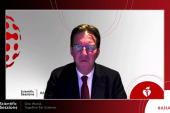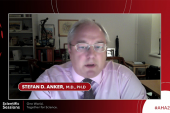QoL Gains Within 15 Days in Acute HF With Empagliflozin: EMPULSE Analysis
This additional observation should serve as a call to prescribe SGLT2 inhibitors early in stabilized patients, Deepak Bhatt says.

WASHINGTON, DC—A secondary analysis of the EMPULSE trial provides more context to the quality-of-life (QoL) benefits of the early initiation of the sodium-glucose cotransporter 2 (SGLT2) inhibitor empagliflozin (Jardiance; Boehringer Ingelheim/Eli Lilly) in patients hospitalized with acute decompensated heart failure.
The main results of EMPULSE showed that starting empagliflozin a median of 3 days after hospitalization led to better survival, fewer hospitalizations, and greater improvements in QoL—all of which made up the primary composite endpoint of total clinical benefit. Although the benefits of SGLT2 inhibitors in chronic HF were well established already, many leading clinical trialists had been advocating for the medications to be started as soon as hospitalized patients are stable, but without the data to back up that recommendation until EMPULSE.
The new prespecified analysis, presented here at the American College of Cardiology (ACC) 2022 Scientific Session by Mikhail N. Kosiborod, MD (Saint Luke’s Mid America Heart Institute, Kansas City, MO), and simultaneously published in Circulation, dove deeper into how trial patients reported feeling on the Kansas City Cardiomyopathy Questionnaire (KCCQ). The empagliflozin patients reported greater improvement across a broad range of health status outcomes as early as 15 days after administration of the drug compared with those on placebo.
Following the presentation, panelist Deepak Bhatt, MD (Brigham and Women’s Hospital, Boston, MA), said the new analysis adds to a wealth of important data on empagliflozin.
“[T]he benefits on clinical endpoints such as heart failure, but now additionally on quality of life—how the patient actually feels—I think it’s quite impressive,” he said. “The fact that the benefit is kicking in so early is also really important and a call to physicians, including cardiologists, to start prescribing these agents. . . . I think these data really support that early initiation, assuming the patient doesn’t have contraindications.”
Benefits Seen Early and Across Subgroups
EMPULSE investigators randomized 530 patients to empagliflozin 10 mg once daily or placebo and followed them for 90 days for the primary composite endpoint of time to death, frequency of HF events, time to first HF event, and change in QoL score from baseline. The study population included patients with and without reduced ejection fraction, diabetes, or de novo or chronic decompensated heart failure. In general, patients had very poor health status at baseline. Those with worse KCCQ at baseline were younger, and more likely to be women or nonwhite and to have diabetes and decompensated HF.
The electronic KCCQ responses tracked in the study at 15, 30, and 90 days were physical symptom score, physical limitation score, QoL, social limitation score, clinical summary score—including symptoms and physical limitations—and overall summary score, which includes all domains.
In the immediate postdischarge period, most patients reported large and rapid improvements in health status, which Kosiborod said is not unexpected among patients discharged from the hospital. Compared with placebo, however, patients in the empagliflozin group still had greater improvement in total symptom score at 15 days, with a between-group difference of 5.35 points (P < 0.01), and a difference of 4.45 points at 90 days (P = 0.03). Similar patterns were seen for the other KCCQ domains, with a difference of 4.40 points on the summary score (P = 0.03), 4.85 points on the clinical summary score (P = 0.02), 4.80 points on the physical limitations score (P = 0.05), and 4.66 points on the QoL score (P = 0.04), all with evidence of benefit by 15 days and sustained benefit at 90 days.
The findings of increased benefit with empagliflozin were consistent across various demographic and clinical subgroups, regardless of HF status, preserved or reduced EF, and baseline KCCQ total symptom score. However, a responder analysis for KCCQ total symptom score deterioration and improvements at 90 days trended toward an advantage for empagliflozin, but did not reach statistical significance. Kosiborod noted that not only were the thresholds developed in chronic—not acute—HF populations, but also the rapid and large improvements in health status in both groups after discharge lessened discriminatory ability.
According to Kosiborod, recent data suggest that patients who go home on an SGLT2 inhibitor have a high likelihood of continuing it after hospitalization for HF, while those discharged home without one are very unlikely to be started on one as outpatients.
“We all know, and we've seen this with other medication classes like statins, that if you don't prescribe in the hospital, it’s unlikely to happen postdischarge,” he added. Also, “it’s more important that they’re prescribed an SGLT2 inhibitor, and less important what kind of SGLT2 inhibitor they are prescribed.”
Bhatt, who was a lead investigator on the SOLOIST-WHF and SCORED trials of the SGLT2 inhibitor sotagliflozin (Zynquista; Sanofi Aventis/Lexicon), noted that emerging data suggest benefit across a range of ejection fractions, including those with HF and preserved ejection fraction (HFpEF), raising the possibility of a class effect.
Kosiborod said the EMPULSE investigators have not yet analyzed outcomes for patients with EF of 50% or greater versus 40% to 49% because of small numbers, but noted that in PRESERVED-HF, patients with an EF of < 60% or > 60% had “absolutely identical” outcomes on the KCCQ.
L.A. McKeown is a Senior Medical Journalist for TCTMD, the Section Editor of CV Team Forum, and Senior Medical…
Read Full BioSources
Kosiborod MN, Angermann CE, Collins SP, et al. Effects of empagliflozin on symptoms, physical limitations, and quality of life in patients hospitalized for acute heart failure: results from the EMPULSE trial. Circulation. 2022;Epub ahead of print.
Disclosures
- EMPULSE was funded by Boehringer Ingelheim and Eli Lilly and Company Diabetes Alliance.
- Kosiborod reports research grants from AstraZeneca and Boehringer Ingelheim; and consulting for Alnylam, AstraZeneca, Amgen, Applied Therapeutics, Bayer, Boehringer Ingelheim, Cytokinetics, Eli Lilly, Esperion, Janssen, Merck, Novo Nordisk, Pharmacosmos, Sanofi, and Vifor.





Comments